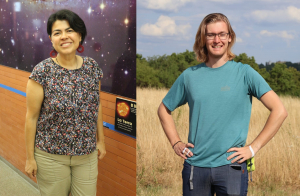Two theses from IFIC awarded the Extraordinary Doctorate Prize by the University of Valencia
Two doctoral theses developed at the Institute of Corpuscular Physics (IFIC, a joint center of the CSIC and the University of Valencia) have been awarded the Extraordinary Doctorate Prize in the field of Physics, a recognition granted annually by the University of Valencia. On this occasion, the recipients of the award are Fabian Esser and Norma Selomit Ramírez.
First, the thesis by Fabian Esser, titled Exploring UV completions of the Standard Model with Effective Field Theories, was supervised by three scientists from the IFIC: Verónica Sanz González, Professor of Theoretical Physics at the University of Valencia, and CSIC researchers Martin Hirsch and Andrea Donini.
This work addresses the search for possible ultraviolet (UV) theories to complete the Standard Model of particle physics. «I like to compare new physics at high energies to a mountain whose summit we might not see, and to relate the search for such physics to possible methods of climbing that mountain. We might find a nice hiking trail, but perhaps we need to scale the very walls», explains Esser. In this regard, a useful tool in indirect searches is Effective Field Theory (EFT), which assumes that the scale of new physics is high compared to the typical energy of the processes under consideration.
In the first part of the thesis, all models that can generate a specific subset of operators from the Standard Model Effective Field Theory (SMEFT) are searched for and classified under well-defined assumptions. Models involving vector-like fermions and heavy scalars that produce four-fermion (4F) operators at dimension-6 or Neutral Triple Gauge Couplings (NTGCs) lead to interesting phenomenology at colliders.
An Axion-Like Particle (ALP) generically refers to a pseudo-Goldstone boson arising from the spontaneous breaking of a global symmetry, for example, from new confining sectors. Assuming that the energy scale associated with this symmetry breaking is high compared to the electroweak scale, this motivates an EFT approach to describe the interactions between ALPs and Standard Model particles.
In the second part of the thesis, direct and indirect collider probes are used to set limits on the couplings between ALPs and Standard Model particles, particularly the top quark.
Dr. Fabian Esser (Leverkusen, Germany, 1995) earned his degree in Physics at RWTH Aachen University in Germany and his Master’s in Theoretical Physics in Aachen and at the Institute for Theoretical Physics (UAM/CSIC) in Madrid. In 2020, he began his PhD thanks to a Santiago Grisolía predoctoral fellowship from the Generalitat Valenciana and carried out research stays at Cambridge and UC Berkeley. Since October 2024, Fabian has been doing his first postdoc at Charles University in Prague, Czech Republic, continuing to explore physics beyond the Standard Model, such as neutrinoless double beta decay and Grand Unified Theories.
On the other hand, the thesis of Norma Selomit Ramírez, titled From a causal representation of multiloop scattering amplitudes to quantum computing in the Loop-Tree Duality, was supervised by Germán Rodrigo, CSIC researcher at IFIC; Germán Sborlini, professor and researcher at the University of Salamanca; and Roger Hernández, professor and researcher at the Autonomous University of Sinaloa (Mexico).
Selomit Ramírez’s thesis addresses current challenges in achieving greater precision in theoretical predictions in high-energy physics. This includes multiloop scattering amplitudes, which describe quantum fluctuations in high-energy scattering processes. Loop-Tree Duality (LTD) is an innovative method proposed to tackle the inherent difficulties in dealing with multiloop amplitudes.
This thesis presents a reformulation of Loop-Tree Duality, a general methodology to obtain amplitude expressions that are manifestly free from unphysical (non-causal) singularities, as well as the first application of a quantum algorithm in Quantum Field Theory. The resulting LTD representation follows a factorized structure in terms of simpler subtopologies, characterized by well-known causal behavior. Moreover, explicit dual analytic representations free of non-causal singularities are obtained, achieving better numerical stability compared to other methods. Finally, the connection between Feynman loop integrals and quantum computing is established, proposing a modification of Grover's quantum algorithm to find the causal singular configurations of multiloop Feynman diagrams.
Norma Selomit Ramírez Uribe (Culiacán, Mexico, 1982) holds a degree in Mathematics from the Autonomous University of Sinaloa (UAS, Mexico) and a Master’s in Science with a specialization in Probability and Statistics from the Center for Research in Mathematics (CIMAT, Mexico). Before starting her PhD, she worked in the private sector as a project leader in the area of credit risk. She also taught at the Faculty of Earth and Space Sciences and the Faculty of Physical-Mathematical Sciences at UAS. During that time, she became involved in topics related to multiloop scattering amplitude calculations, which motivated her to pursue a doctoral degree in Physics.
Currently, Dr. Selomit Ramírez works at the Autonomous University of Sinaloa as a professor and researcher. She also serves as the state delegate for Sinaloa in the Mexican Mathematics Olympiad. Additionally, she continues collaborating with the LHCPHENO theory group at IFIC on topics related to LTD and the application of quantum algorithms. Dr. Selomit was also awarded the CSIC Outstanding Thesis Award in the most recent edition
More information is available through the official website (UV).




















